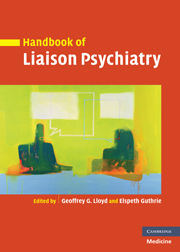Book contents
- Frontmatter
- Contents
- List of contributors
- Preface
- Part I Basic skills
- Part II Common psychiatric problems across the general hospital
- Part III Working with specific units
- 14 Neurological disorders
- 15 Cardiorespiratory disorders
- 16 Gastrointestinal disorders
- 17 Liver disorders
- 18 Endocrine disorders
- 19 Diabetes
- 20 HIV and AIDS
- 21 Renal disease
- 22 Musculo-skeletal disorders
- 23 Oncology
- 24 Head and neck cancer
- 25 Palliative care
- 26 Cosmetic procedures
- 27 Perinatal and gynaecological disorders
- 28 The intensive care unit
- 29 The burns unit
- 30 Psychocutaneous disorders
- 31 Genitourinary disorders
- 32 The emergency department
- Part IV Treatment
- Part V Different treatment settings
- Index
- References
23 - Oncology
from Part III - Working with specific units
Published online by Cambridge University Press: 10 December 2009
- Frontmatter
- Contents
- List of contributors
- Preface
- Part I Basic skills
- Part II Common psychiatric problems across the general hospital
- Part III Working with specific units
- 14 Neurological disorders
- 15 Cardiorespiratory disorders
- 16 Gastrointestinal disorders
- 17 Liver disorders
- 18 Endocrine disorders
- 19 Diabetes
- 20 HIV and AIDS
- 21 Renal disease
- 22 Musculo-skeletal disorders
- 23 Oncology
- 24 Head and neck cancer
- 25 Palliative care
- 26 Cosmetic procedures
- 27 Perinatal and gynaecological disorders
- 28 The intensive care unit
- 29 The burns unit
- 30 Psychocutaneous disorders
- 31 Genitourinary disorders
- 32 The emergency department
- Part IV Treatment
- Part V Different treatment settings
- Index
- References
Summary
Despite considerable advances in medical treatment cancer is still one of the most frightening diagnoses a doctor can convey to a patient. In the minds of most people malignancy is associated with severe pain, disfigurement, impaired quality of life and drastically reduced life expectancy. Surgical treatment is feared because it may result in altered appearance and body image. Chemotherapy and radiotherapy are also viewed apprehensively. Chemotherapy, in particular, is feared because of its association with nausea, vomiting, fatigue and hair loss.
Not surprisingly the prevalence of psychiatric disorders is high. Many studies have reported on the prevalence of psychiatric disorders in different groups of patients. Variations in reported rates are due to differences in sampling methods and the methods of assessment used. They do not necessarily reflect differences in the actual prevalence of psychiatric disorders in different types of malignancy. However some cancers are associated with particular problems involving anatomical loss, sexual difficulties and reduced fertility. Reviews of the literature have indicated that up to half of patients have a clinical disorder at any time (Cull 1990; McDaniel et al. 1995). Affective disorders are particularly common. Fallowfield et al. (1990) observed that a quarter of women developed an affective disorder following surgical treatment for breast cancer. Parle et al. (1996) conducted a prospective study of 600 cancer patients over a two-year period and found that 20% had an affective disorder.
- Type
- Chapter
- Information
- Handbook of Liaison Psychiatry , pp. 547 - 563Publisher: Cambridge University PressPrint publication year: 2007
References
- 5
- Cited by



